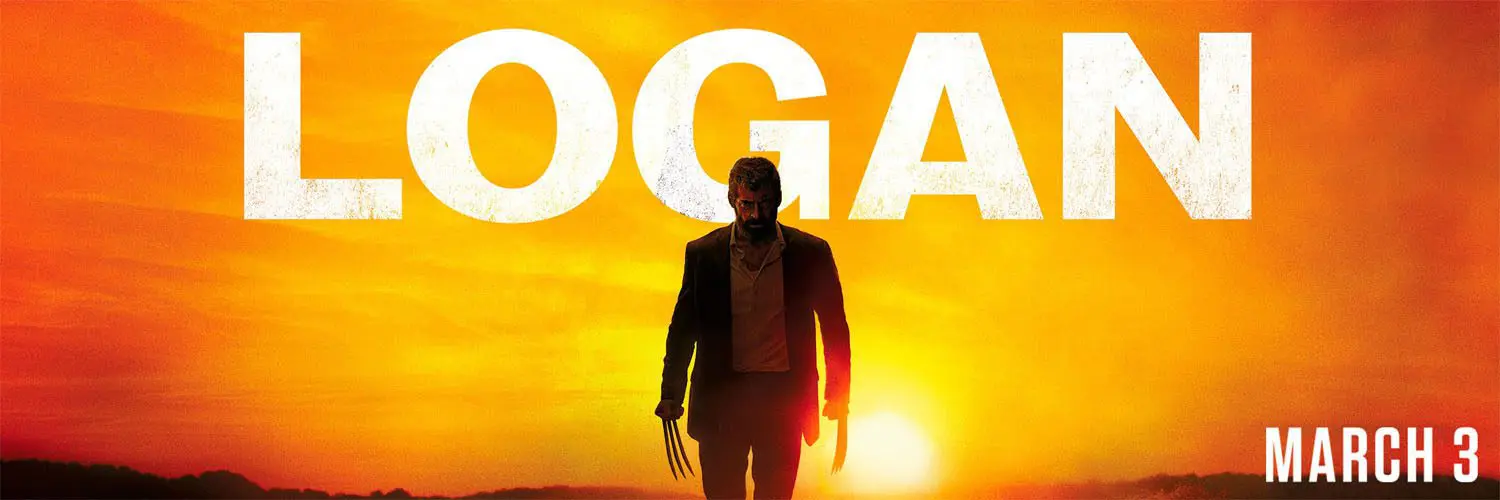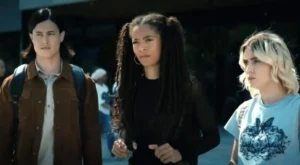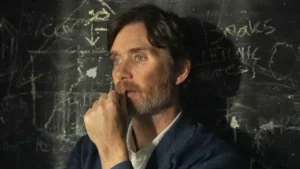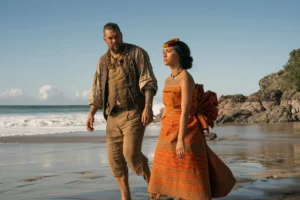You’d need all ten fingers and probably six claws to count the ways in which Logan shouldn’t work. For one thing, it’s not an X-Men movie. There aren’t any cute nods towards the broader continuity because everyone has been mundanely written out of it. Hugh Jackman’s Wolverine and Patrick Stewart’s Professor X are all that’s left, but not in any form you’d recognise. Logan’s chauffeuring twenty-somethings to bachelorette parties in a limo he drinks himself to sleep in. The only time we see him smile is when one of the looser party-girls flashes her tits at him, and while I assume she doesn’t realize he’s over a hundred years old at this point, he’s starting to look it. He’s let his signature mutton chops meet in the middle, and his claws don’t extend properly. He’s not committed to saving the world anymore because, in 2029, there doesn’t seem to be much of it left to save. But he is committed to playing caregiver to his mentor, Charles, whose decaying super-brain makes time stop and the earth rumble whenever he gets a headache.
This isn’t much of a superhero movie, either. Logan’s healing powers are on the fritz, and Charles’s formidable psychic noggin is now a danger to everyone around him. The things that make these people super are killing them; any reasons they had to be heroic are gone. You can’t even slip Logan under the more accommodating comic-book umbrella. It’s ostensibly based on Mark Millar’s Old Man Logan, but it only seems to have a relationship with the faded X-Men volumes Logan brandishes in the movie. He lets everyone know they’re full of shit.
The X-Men franchise might be the only context in which that kind of cutesy meta reference is acceptable. Jackman’s gruff physicality and Stewart’s stentorian stewardship have been the only constants in a series that has never managed to maintain a consistent cast, timeline or level of quality. We’ve been watching almost two decades of X-Men movies and have only ever seen three truly good ones: Bryan Singer’s X2, Matthew Vaughn’s First Class, and Deadpool. If you were feeling charitable you could make a case for the groovy bits of Days of Future Past, but the rest have ranged from okay to utterly abysmal. This is Jackman’s 10th time playing the character, but it’s the first time he’s been allowed to make the character matter.
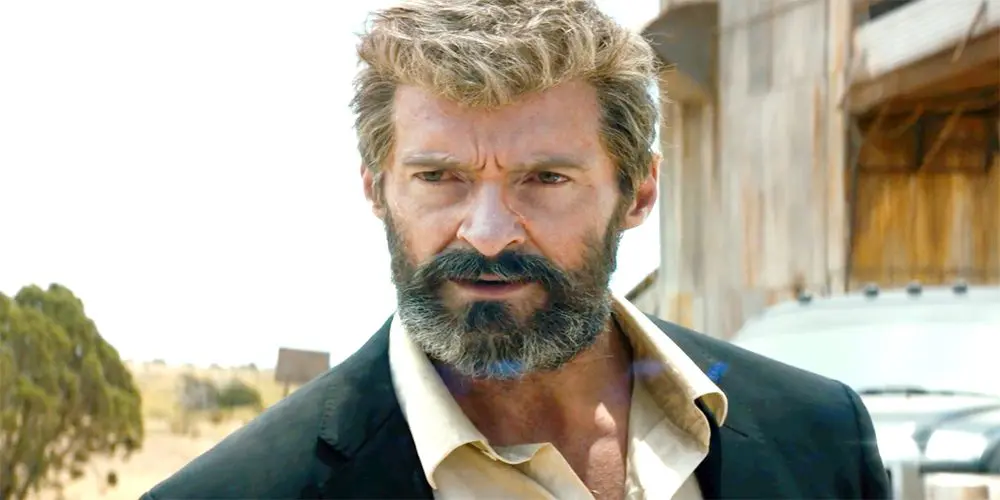
And the character certainly does matter, in the cultural consciousness if nothing else. Wolverine is the X-Men, and Jackman is Wolverine. He’s as inextricably linked to the character as Christopher Reeve is to Superman and Heath Ledger is to the Joker; recasting this part would be so difficult that I don’t even think it’s worth attempting. Jackson might have showed up in other movies, but he’s only ever starred in these ones. His entire screen presence is defined by terrible facial hair and veiny aggression. All of this is a big part of the reason why Logan could never be replicated, but also why it feels so knowingly transcendent. For once, the filmmaking and storytelling of an X-Men instalment feel as steroidal as the hero.
But what is Logan, then, if it’s none of the things you’d expect it to be? Mostly it’s a western. But it’s also kind of a neo-noir dystopian road-trip, which is as incredible a sentence as I’ve ever written. It’s also very, very good. And I don’t mean it’s very good for what it is, partly because it’s so nebulous and singular that the comparison wouldn’t mean anything, but mostly because that’d be drastically underselling it. It’s very good, period; arguably the best deconstructionist comic-book movie ever made, and of a piece with seminal genre titans such as the Richard Donner cut of Superman II and Christopher Nolan’s The Dark Knight. Honestly, I’m as surprised as anyone.
Yet, here we are – “here” being an abandoned smelting plant in El Paso, Texas, where Logan is living in secrecy with a doped-up Charles and a photosensitive albino tracker (Stephen Merchant), who’s using his powers to forewarn them of any trouble. Trouble finds them, of course, but not in the way they expect. It takes the shape of a young girl, a mostly-mute 11-year-old named Laura, as played by the revelatory newcomer Dafne Keen. Laura isn’t trouble in herself, but it’s following her. Laura, meet Logan. She’s the product of his mutant DNA and the meddlesome genetic experimentation of Richard E. Grant’s pale-eyed scientist villain, and she needs to get where she’s going fast. Close behind is a squadron of cybernetically-enhanced troopers led by Donald Pierce (Boyd Holbrook), and in a bizarrely topical coincidence, Laura is a Mexican immigrant seeking to cross the U.S. border into the safety of Canada with a handful of other young mutant escapees.
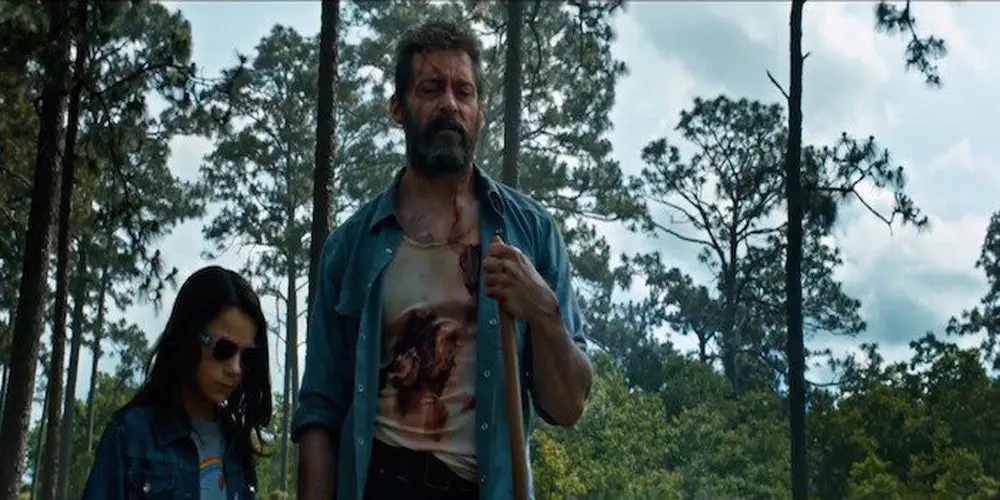
If you closed your eyes, you could trace the shape of a classic western beneath Logan’s bleak sandscapes. Giving the grizzled hero a young ward isn’t new, nor is the elegiac tone of Logan’s redemptive last hoorah, but there’s something about the way the movie treats Laura that feels unprecedented outside of Kick-Ass-style parody. She’s inherited daddy’s adamantium-fused bone claws and other attendant abilities, but she’s given more chance to use them here than Logan has had in nine prior movies. And it’s a shock. An R-rated version of Wolverine always seemed appealing, and when Logan takes the gloves off, so to speak, it delivers bloody dismemberments and eviscerations by the bucket-load. But an R-rated version of Wolverine’s daughter wasn’t something I knew I wanted until I saw it, and now a part of me wishes I hadn’t. It isn’t that Logan’s action sequences aren’t great – they are, and they’re exactly the kind of sequences that you’ve been longing for since this character first appeared onscreen. It’s just that, like a lot of things in Logan, when the action occurs it’s mean and nasty and faintly depressing. More than the legions of nameless henchman that get sliced and diced by Logan and Laura both, the movie bleeds the fun and glamour out of superhero fiction. It foregrounds bodily consequence in a way that, in the Marvel stable, only Daredevil has managed to do before. Yet even that series didn’t cast a preteen little girl as the avatar of its excesses.
None of this is a criticism. It’s simply emblematic of Logan’s willingness – eagerness, even – to take audiences to a place they weren’t expecting, and relentlessly shock and disappoint them when they get there. Again, not a criticism. Logan is nakedly about disappointment. It’s an extended lamentation of an ideal world being unattainable; of the heroes being defeated; of a shared dream being lost. It’s wrenchingly sad at times, in part because it trades in the fate of characters you’ve come to know and care about over many years, but more so because it reminds you that in life – and, sometimes, even in the movies – there isn’t always a happy ending. The good guys don’t always win; the bad guys don’t always receive their comeuppance. You don’t always get to where you want to be.
As remarkably downbeat as all this sounds, Logan earns it. The script that director Jason Mangold wrote with Scott Frank and Michael Green tempers the brutality and crushing dreariness with careful introspection and, occasionally, a glimmer of hope. At one point Charles says to Logan, “I always know who you are, I just don’t always recognise you.” It’s as good a description of the movie as any; the same, but different. His degenerative neurological disease seems to have given old Xavier a certain way with words. He has a few more that I think some up everything better than I could: “This is what life looks like – people love each other.”

